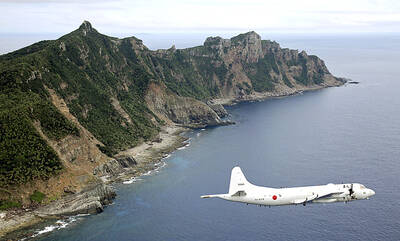Toyota started recalling more than 90,000 luxury Lexus and Crown vehicles yesterday in Japan over defective engines — the latest setback for the automaker beset with quality problems.
Toyota Motor Corp spokesman Paul Nolasco said recalls in overseas markets will follow soon, totaling about 270,000 vehicles globally.
That includes: 138,000 vehicles in the US, 15,000 in Europe, 10,000 in the Middle East, 6,000 in China, 4,000 in Canada and 8,000 in other regions.
Toyota told the Japanese government yesterday it was recalling 91,903 vehicles for flaws in the valve springs, a crucial engine component, that could make the automobile stall while in motion.
“We apologize for inconveniencing our customers. We hope to fix the problem soon,” Nolasco said.
The quality problem affecting top-of-the-line products comes as Toyota struggles to move on from massive global recalls that started in October last year. It already has recalled more than 8.5 million vehicles for various problems, including sticking gas pedals, braking software glitches and defective floor mats.
The world’s top automaker was fined a record US$16.4 million in the US for responding too slowly when the recall crisis erupted.
The latest woes come on top of a recall last week for 17,000 Lexus hybrids after testing showed fuel can spill during a rear-end crash.
Analysts said yesterday’s recall did little to instill consumer confidence after Toyota president Akio Toyoda, facing shareholders last month, vowed to improve vehicle quality inspections.
“It is not doing a good job in communicating a message about what exactly it is doing to beef up quality checks,” said Shotaro Noguchi, auto analyst with Nomura Securities Co in Tokyo. “So it is hard for people to believe Toyota is taking the customer’s view as it is promising to do.”
The company announced the latest quality problems last week. Some 180,000 of the defective automobiles were sold overseas, 138,000 of them in the US.
No accidents or injuries have been reported because of the defect.
About 220 complaints have been reported.
Toyota said it was replacing the valve spring in the recalled vehicles, produced between July 2005 and August 2008 — Lexus models GS350, GS450h, GS460, IS350, LS460, LS600h, LS600hL and Crown models.
Toyota also faces more than 200 lawsuits in the US tied to accidents involving defective automobiles, the lower resale value of Toyota vehicles, and a drop in its stock value.
Also See: Auto sales slow in China

MISINFORMATION: The generated content tends to adopt China’s official stance, such as ‘Taiwan is currently governed by the Chinese central government,’ the NSB said Five China-developed artificial intelligence (AI) language models exhibit cybersecurity risks and content biases, an inspection conducted by the National Security Bureau (NSB) showed. The five AI tools are: DeepSeek, Doubao (豆包), Yiyan (文心一言), Tongyi (通義千問) and Yuanbao (騰訊元寶), the bureau said, advising people to remain vigilant to protect personal data privacy and corporate business secrets. The NSB said it, in accordance with the National Intelligence Services Act (國家情報工作法), has reviewed international cybersecurity reports and intelligence, and coordinated with the Ministry of Justice Investigation Bureau and the National Police Agency’s Criminal Investigation Bureau to conduct an inspection of China-made AI language

BOOST IN CONFIDENCE: The sale sends a clear message of support for Taiwan and dispels rumors that US President Donald Trump ‘sold out’ the nation, an expert said The US government on Thursday announced a possible sale to Taiwan of fighter jet parts, which was estimated to cost about US$330 million, in a move that an expert said “sends a clear message of support for Taiwan” amid fears that Washington might be wavering in its attitude toward Taipei. It was the first announcement of an arms sale to Taiwan since US President Donald Trump returned to the White House earlier this year. The proposed package includes non-standard components, spare and repair parts, consumables and accessories, as well repair and return support for the F-16, C-130 and Indigenous Defense Fighter aircraft,

CHECKING BOUNDARIES: China wants to disrupt solidarity among democracies and test their red lines, but it is instead pushing nations to become more united, an expert said The US Department of State on Friday expressed deep concern over a Chinese public security agency’s investigation into Legislator Puma Shen (沈伯洋) for “secession.” “China’s actions threaten free speech and erode norms that have underpinned the cross-strait ‘status quo’ for decades,” a US Department of State spokesperson said. The Chongqing Municipal Public Security Bureau late last month listed Shen as “wanted” and launched an investigation into alleged “secession-related” criminal activities, including his founding of the Kuma Academy, a civil defense organization that prepares people for an invasion by China. The spokesperson said that the US was “deeply concerned” about the bureau investigating Shen

DISPUTE: A Chinese official prompted a formal protest from Tokyo by saying that ‘the dirty head that sticks itself out must be cut off,’ after Takaichi’s Taiwan remarks Four armed China Coast Guard vessels yesterday morning sailed through disputed waters controlled by Japan, amid a diplomatic spat following Japanese Prime Minister Sanae Takaichi’s comments on Taiwan. The four ships sailed around the Senkaku Islands — known as the Diaoyutai Islands (釣魚台) to Taiwan, and which Taiwan and China also claim — on Saturday before entering Japanese waters yesterday and left, the Japan Coast Guard said. The China Coast Guard said in a statement that it carried out a “rights enforcement patrol” through the waters and that it was a lawful operation. As of the end of last month,